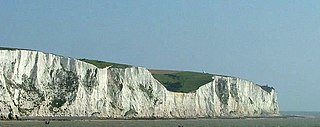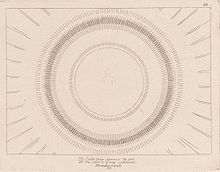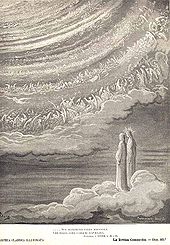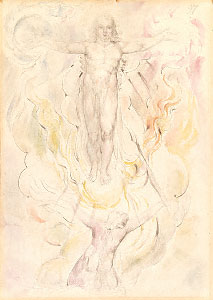The Harlot and the Giant
From Purgatorio xxxii:
E'en thus the goodly regiment of heav'n
Proceeding, all did pass us, ere the car
Had slop'd his beam. Attendant at the wheels
The damsels turn'd; and on the Gryphon mov'd
The sacred burden, with a pace so smooth,
No feather on him trembled. The fair dame
Who through the wave had drawn me, companied
By Statius and myself, pursued the wheel,
Whose orbit, rolling, mark'd a lesser arch.
Through the high wood, now void (the more her blame,
Who by the serpent was beguil'd) I past
With step in cadence to the harmony
Angelic. Onward had we mov'd, as far
Perchance as arrow at three several flights
Full wing'd had sped, when from her station down
Descended Beatrice. With one voice
All murmur'd "Adam," circling next a plant
Despoil'd of flowers and leaf on every bough.
Its tresses, spreading more as more they rose,
Were such, as 'midst their forest wilds for height
The Indians might have gaz'd at. "Blessed thou!
Gryphon, whose beak hath never pluck'd that tree
Pleasant to taste: for hence the appetite
Was warp'd to evil." Round the stately trunk
Thus shouted forth the rest, to whom return'd
The animal twice-gender'd: "Yea: for so
The generation of the just are sav'd."
And turning to the chariot-pole, to foot
He drew it of the widow'd branch, and bound
There left unto the stock whereon it grew.
As when large floods of radiance from above
Stream, with that radiance mingled, which ascends
Next after setting of the scaly sign,
Our plants then burgeon, and each wears anew
His wonted colours, ere the sun have yok'd
Beneath another star his flamy steeds;
Thus putting forth a hue, more faint than rose,
And deeper than the violet, was renew'd
The plant, erewhile in all its branches bare.
Unearthly was the hymn, which then arose.
I understood it not, nor to the end
Endur'd the harmony. Had I the skill
To pencil forth, how clos'd th' unpitying eyes
Slumb'ring, when Syrinx warbled, (eyes that paid
So dearly for their watching,) then like painter,
That with a model paints, I might design
The manner of my falling into sleep.
But feign who will the slumber cunningly;
I pass it by to when I wak'd, and tell
How suddenly a flash of splendour rent
The curtain of my sleep, and one cries out:
"Arise, what dost thou?" As the chosen three,
On Tabor's mount, admitted to behold
The blossoming of that fair tree, whose fruit
Is coveted of angels, and doth make
Perpetual feast in heaven, to themselves
Returning at the word, whence deeper sleeps
Were broken, that they their tribe diminish'd saw,
Both Moses and Elias gone, and chang'd
The stole their master wore: thus to myself
Returning, over me beheld I stand
The piteous one, who cross the stream had brought
My steps. "And where," all doubting, I exclaim'd,
"Is Beatrice?"--"See her," she replied,
"Beneath the fresh leaf seated on its root.
Behold th' associate choir that circles her.
The others, with a melody more sweet
And more profound, journeying to higher realms,
Upon the Gryphon tend." If there her words
Were clos'd, I know not; but mine eyes had now
Ta'en view of her, by whom all other thoughts
Were barr'd admittance. On the very ground
Alone she sat, as she had there been left
A guard upon the wain, which I beheld
Bound to the twyform beast. The seven nymphs
Did make themselves a cloister round about her,
And in their hands upheld those lights secure
From blast septentrion and the gusty south.
"A little while thou shalt be forester here:
And citizen shalt be forever with me,
Of that true Rome, wherein Christ dwells a Roman
To profit the misguided world, keep now
Thine eyes upon the car; and what thou seest,
Take heed thou write, returning to that place."
Thus Beatrice: at whose feet inclin'd
Devout, at her behest, my thought and eyes,
I, as she bade, directed. Never fire,
With so swift motion, forth a stormy cloud
Leap'd downward from the welkin's farthest bound,
As I beheld the bird of Jove descending
Pounce on the tree, and, as he rush'd, the rind,
Disparting crush beneath him, buds much more
And leaflets. On the car with all his might
He struck, whence, staggering like a ship, it reel'd,
At random driv'n, to starboard now, o'ercome,
And now to larboard, by the vaulting waves.
Next springing up into the chariot's womb
A fox I saw, with hunger seeming pin'd
Of all good food. But, for his ugly sins
The saintly maid rebuking him, away
Scamp'ring he turn'd, fast as his hide-bound corpse
Would bear him. Next, from whence before he came,
I saw the eagle dart into the hull
O' th' car, and leave it with his feathers lin'd;
And then a voice, like that which issues forth
From heart with sorrow riv'd, did issue forth
From heav'n, and, "O poor bark of mine!" it cried,
"How badly art thou freighted!" Then, it seem'd,
That the earth open'd between either wheel,
And I beheld a dragon issue thence,
That through the chariot fix'd his forked train;
And like a wasp that draggeth back the sting,
So drawing forth his baleful train, he dragg'd
Part of the bottom forth, and went his way
Exulting. What remain'd, as lively turf
With green herb, so did clothe itself with plumes,
Which haply had with purpose chaste and kind
Been offer'd; and therewith were cloth'd the wheels,
Both one and other, and the beam, so quickly
A sigh were not breath'd sooner. Thus transform'd,
The holy structure, through its several parts,
Did put forth heads, three on the beam, and one
On every side; the first like oxen horn'd,
But with a single horn upon their front
The four. Like monster sight hath never seen.
O'er it methought there sat, secure as rock
On mountain's lofty top, a shameless whore,
Whose ken rov'd loosely round her. At her side,
As 't were that none might bear her off, I saw
A giant stand; and ever, and anon
They mingled kisses. But, her lustful eyes
Chancing on me to wander, that fell minion
Scourg'd her from head to foot all o'er; then full
Of jealousy, and fierce with rage, unloos'd
The monster, and dragg'd on, so far across
The forest, that from me its shades alone
Shielded the harlot and the new-form'd brute.
********************************************************
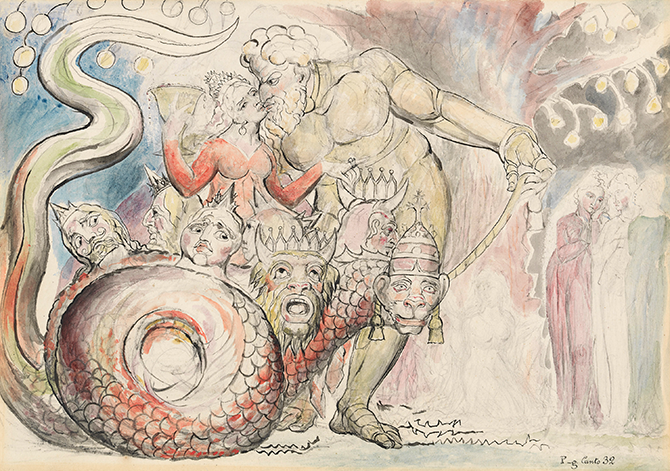 |
| Blake's Illustrations of Dante |
This is the last of the Purgatory series.
Other 'Blake Illustrations'address Paradise.



